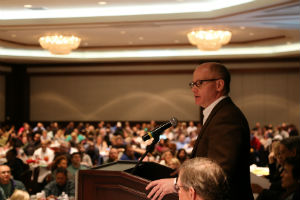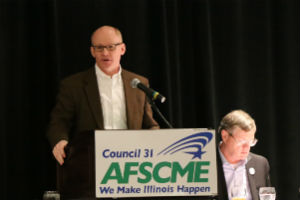- Details
- Category: News
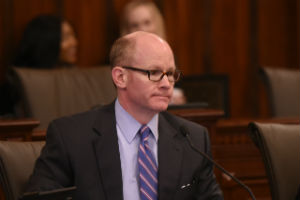 SPRINGFIELD – Senator Don Harmon (D-Oak Park) released the following statement in response to Gov. Bruce Rauner’s budget address today:
SPRINGFIELD – Senator Don Harmon (D-Oak Park) released the following statement in response to Gov. Bruce Rauner’s budget address today:
“The governor failed basic budget math today. Forcing another government to pay your bills does not cut government spending or reduce the burden on taxpayers. It just shifts the blame to somebody else. Avoiding blame seems to be the governor’s specialty.”
“We’ve talked about responsibly shifting new teacher pension costs to school districts, but in a way that won’t hit property taxpayers. No one who is serious about governing would ever suggest the rapid and crippling ‘cost-shift’ the governor proposed today.”
“Secondly, you can’t brag about giving schools an additional $350 million while at the same time forcing $490 million in new costs on them. That’s not an increase – it’s a $140 million decrease.”
“The governor may tout the education funding reform bill as an accomplishment of his, but his proposed budget breaks the deal we made to increase funding for schools.”
- Details
- Category: News
 SPRINGFIELD – The day before Governor Rauner’s budget address, Illinois House and Senate Democratic caucuses are uniting once again to reintroduce the Illinois Comeback Agenda. This year, the group of rank-and-file legislators has narrowed their agenda to focus on creating and supporting good, safe Illinois jobs.
SPRINGFIELD – The day before Governor Rauner’s budget address, Illinois House and Senate Democratic caucuses are uniting once again to reintroduce the Illinois Comeback Agenda. This year, the group of rank-and-file legislators has narrowed their agenda to focus on creating and supporting good, safe Illinois jobs.
The lawmakers developed the policy agenda to focus four areas key to working Illinoisans’ ability to build economic security.
• Better wages – someone working full time should not be struggling to get by.
• Better benefits – basic benefits like paid sick leave, fair scheduling and protections against wage theft give workers job security and keep workplaces safe.
• Investing in Illinois – we can be smarter with our tax incentives, and reclaim money from corporations who take significant tax breaks and then ship jobs out of Illinois.
• Inclusive Infrastructure – construction and capital projects must prioritize hiring historically disenfranchised populations, and prioritize in historically disenfranchised communities.
These rank-and-file lawmakers first introduced the Illinois Comeback Agenda last year, and say they joined together again to narrow the scope for a more focused approach. The group says their agenda, in part, is in response to the governor’s focus on job creation.
“When I talk to my constituents, when my colleagues talk to their constituents, we’re all hearing the same thing,” said Senator Don Harmon (D-Oak Park). “It all comes back to jobs. What is really missing from our discussion about job growth in Springfield, however, is the quality of jobs and people’s ability to get by. Job growth can’t just be about the number of jobs, it has to be about the kind of jobs that actually help people build economic security.”
“We’re glad the governor is focused on job growth,” said Representative Carol Ammons (D-Champaign). “If we want real economic recovery in this state, we do need more jobs. But creating more and more low wage jobs without basic protections like sick leave keeps workers jumping from job to job, always struggling to get by. It doesn’t have to be like that.”
“Right now it feels as if we’re measuring job growth by asking CEOs how happy they are here in Illinois,” said Representative Will Guzzardi (D-Chicago). “It’s almost as if we’ve forgotten that governing is about making Illinois a good place to live and work for everyone. What we’re talking about here is pretty basic: working people should be able to support their families, stay home if they’re sick, our tax dollars should benefit Illinois jobs, and our infrastructure projects should be smart and inclusive. Combined, these initiatives will give working Illinois families a fair shot.”
Learn more about the Illinois Comeback Agenda at www.comebackil.com.
- Details
- Category: News
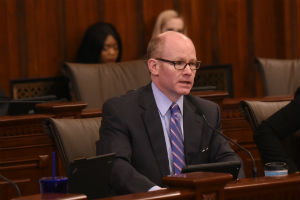 SPRINGFIELD – Legislation giving patients access to medical alternatives to prescription painkillers passed the Senate Executive Committee today.
SPRINGFIELD – Legislation giving patients access to medical alternatives to prescription painkillers passed the Senate Executive Committee today.
Senator Don Harmon (D-Oak Park) introduced the Alternatives to Opioids Act to tackle the opioid crisis, an epidemic that killed more than 60,000 people nationwide last year.
The measure would allow people who have been prescribed opioids for a medical condition to apply for a temporary medical cannabis card instead.
“This is a common-sense method to address the issue of opioid addiction,” Harmon said. “We know that medical cannabis is a safe alternative treatment for the same conditions for which opioids are prescribed.”
Melissa Burton-Sanders testified to the committee that using medical marijuana to treat her multiple sclerosis symptoms instead of opioids has been a blessing.
“I am no longer in pain. I am a better parent,” said Burton-Sanders, a mother of five. “I am present for my children and that is worth everything in the world to me.
Illinois created the Compassionate Use of Medical Cannabis Pilot Program in 2013 and is one of 29 states to have legalized medical cannabis.
Senate Bill 336 passed the Executive Committee 16-1 and will now head to the full Senate for consideration.
- Details
- Category: News
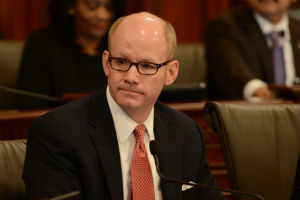 Senator Don Harmon (D-Oak Park) released the following statement in response to Gov. Bruce Rauner’s State of the State address today:
Senator Don Harmon (D-Oak Park) released the following statement in response to Gov. Bruce Rauner’s State of the State address today:
“Everything the governor said today is empty rhetoric if he breaks the promise he just made and again next month fails to present a balanced budget.
“The more the governor speaks, the more obvious it is that he is living in an alternate reality. He talks about working together across the aisle, when his refusal to compromise on a balanced budget tripled our state’s debt and left us on the brink of disaster.
“He talked again about decreasing property taxes. In reality, the only way to provide tax relief for middle-class families without causing more financial damage is to move to a fair tax system, something I’ve never heard the governor support.
“I hope Governor Rauner joins us in reality next month when he presents his budget address. If not, we will have to do his job for him again.”
- Details
- Category: News
Senator Don Harmon delivered a speech to the AFSCME Council 31 2018 Legislative Convention in Springfield on January 27, 2018.
Harmon discussed the governor's efforts to sabotage contract negotiations between AFSCME and the State. He also shared his vision for an overhaul of the state's tax system, moving from a flat tax to a fair tax.
"We must abandon the archaic system we have of rewarding the rich and abandoning the poor," Harmon said. "And supporting union workers is key to sustaining the middle class."
Harmon has introduced several measures in the past to amend the Illinois Constitution and allow for voters to take up the question of a fair tax on a ballot measure.
The annual convention drew hundreds of delegates from local unions across the state.
